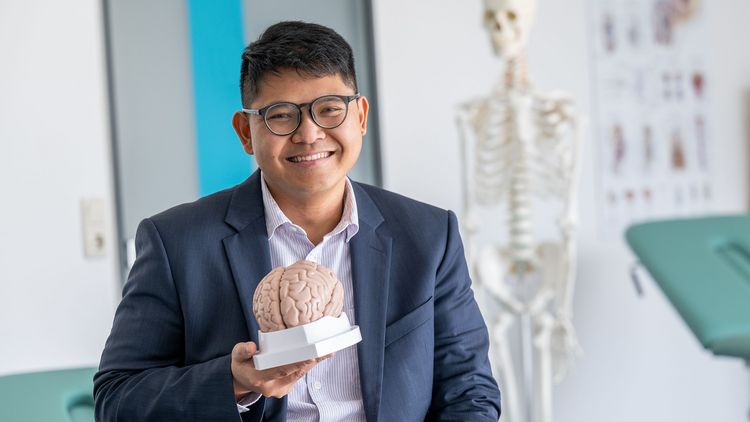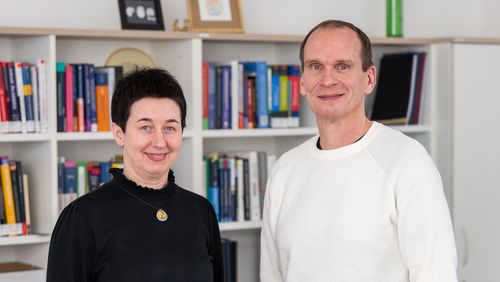Taps, cars, brains –these three seemingly different concepts could encapsulate Dr Daniel Kristanto's scientific career. "I've always been interested in systems and wanted to understand how they work," says the 31-year-old physics engineer. His bachelor's thesis, which he completed at Gadjah Mada University in Indonesia, was about industrial measurement technology for monitoring fluid flows. "Put simply, one could say that fluid flows function in a similar way to a kitchen tap," he explains. Then his master's thesis, which he did at Thammasat University (Thailand), was about controlling air conditioning systems in cars, and after that his doctoral thesis took him to Hong Kong Baptist University, where a research group is investigating neuronal information processing in the human brain.
Kristan came to Germany in 2022 on a six-month Joint Fellowship funded by the Hanse-Wissenschaftskolleg Institute for Advanced Study in Delmenhorst and the University of Oldenburg's School of Medicine and Health Sciences. Before securing his current funding, he worked at the Department of Psychology in a research group led by Professor Andrea Hildebrandt, a colleague of his doctoral supervisor in Hong Kong. Kristantos was not alone when he left Hong Kong to come to Oldenburg three years ago: his wife and their daughter, now four and a half years old, accompanied him. "We love Oldenburg and can certainly imagine living here later on," says Kristanto.
At the centre of Kristanto's research is the desire to better understand and visualise what goes on in the human brain – probably the most complex of all systems. With the "Individual Brain Project", he aims to develop methods that optimise modern approaches to individualised brain research. In the past, brain research generally took a quantitative approach: scientists analysed vast quantities of brain scans from different individuals looking for matches indicating that certain patterns of activity in the brain could be triggered by a specific sensory stimulus to which all test subjects had been exposed. "However, such group findings generally can't be simply be transferred to individual brains due, for one thing, to a lack of replicability," Kristanto explains. "So what may be true for a group of people included in a study often doesn't necessarily apply to the individual members of that group. "
In Kristanto's eyes, looking at groups instead of individuals leads to generalisations, which although necessary with this approach can also stand in the way of new insights. "Every brain is unique. If you use standards that apply for the average brain in your analyses, the results can only be of limited value," he says. In the coming years he plans to lay the foundations for the development of methods based on MRI images to create individual brain models – which are as unique as a fingerprint – that can then be employed in research and diagnostics.
As a first step, he plans to analyse the current scientific standards on the subject of brain scans. "I want to establish a publicly accessible knowledge repository which not only contains research results and methods, but also focuses on the connections between the two," says Kristanto. And he would make it available to other researchers too. He himself plans to develop new methods on this basis.
For his research, he relies among other things on combinations of brain scans that have been carried out on a single brain, but with different objectives, and which, when taken together, can provide a more comprehensive image of the brain – from the structural features such as the thickness of the cerebral cortex to visual representations of brain functions. His goal is to uncover individual brain characteristics by taking characteristics that individuals may share, such as age, and linking them to individual brain functions. "Put simply, this is based on a similar idea to the personalised film recommendations we get from streaming service providers. They combine comparable data such as age with highly personal viewing habits and thus create user profiles for which personalised film recommendations can be made," Kristanto explains. He also plans to use data for comparable demographic groups to look for similarities in the corresponding brain scans. Powerful AI tools will be employed to search for these similarities.
The University's Carl von Ossietzky Young Researchers' Fellowships were created to give researchers the opportunity to deepen their own research while at the same time working on applications for third-party funding. "I'm truly grateful for this opportunity," says Kristantos, who has a particularly ambitious schedule: he also plans to apply to the German Research Foundation for funding in its Emmy Noether Programme this year.
There's plenty of work to be done in the "Individual Brain Project". Kristanto is determined to make the results of his work accessible to everyone. "In the end, both known and new methods should be available to others, even those who perhaps lack the relevant experience. I want to pack the methods into a kind of modular toolbox that other researchers can use according to their needs," says the physics engineer. His overall aim is that eventually his work will contribute to people receiving a personalised diagnosis based on brain scans and a therapy tailored to their individual clinical picture.




